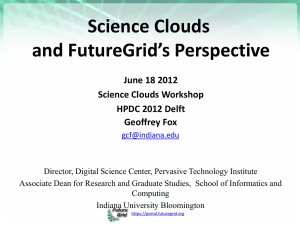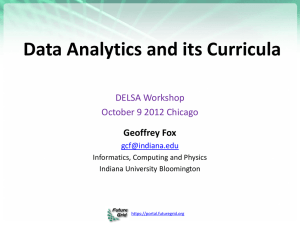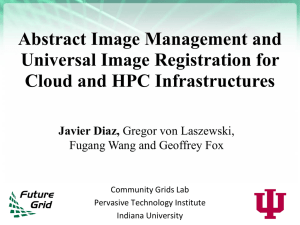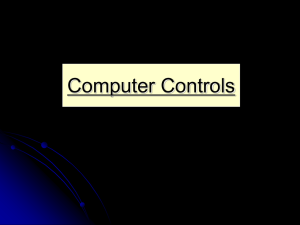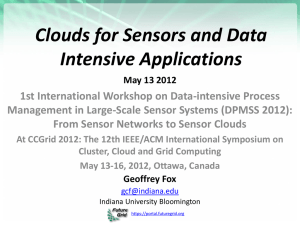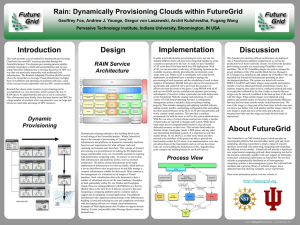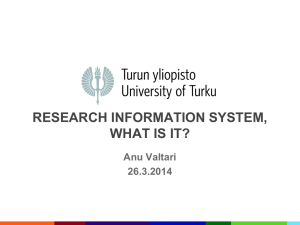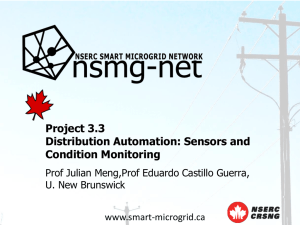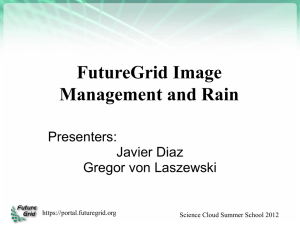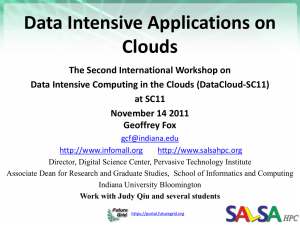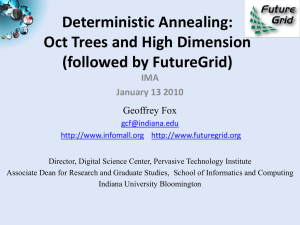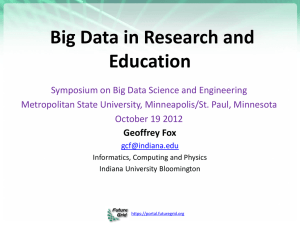Sensors - Community Grids Lab
advertisement
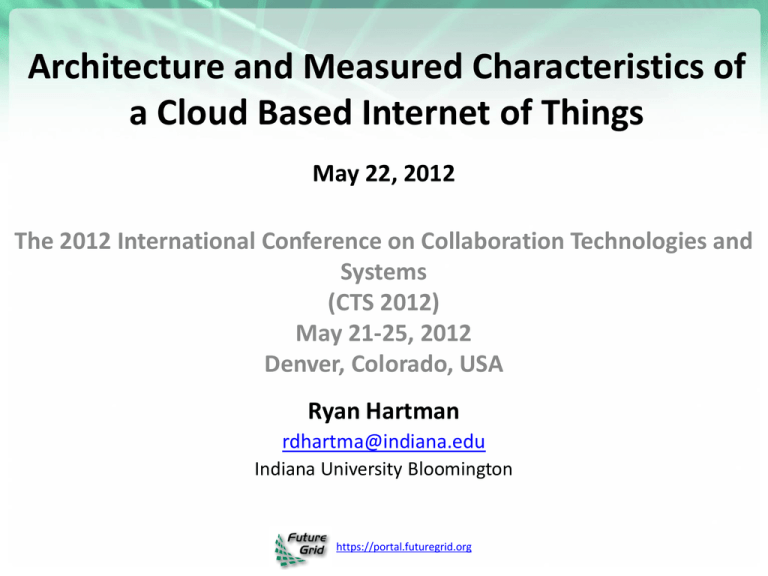
Architecture and Measured Characteristics of a Cloud Based Internet of Things May 22, 2012 The 2012 International Conference on Collaboration Technologies and Systems (CTS 2012) May 21-25, 2012 Denver, Colorado, USA Ryan Hartman rdhartma@indiana.edu Indiana University Bloomington https://portal.futuregrid.org Collaborators • Principal Investigator Geoffrey Fox • Graduate Student Team – Supun Kamburugamuve – Bitan Saha – Abhyodaya Padiyar • https://sites.google.com/site/opensourceiotcloud/ https://portal.futuregrid.org 2 Internet of Things and the Cloud • It is projected that there will soon be 50 billion devices on the Internet. Most will be small sensors that send streams of information into the cloud where it will be processed and integrated with other streams and turned into knowledge that will help our lives in a million small and big ways. • It is not unreasonable for us to believe that we will each have our own cloud-based personal agent that monitors all of the data about our life and anticipates our needs 24x7. • The cloud will become increasing important as a controller of and resource provider for the Internet of Things. • As well as today’s use for smart phone and gaming console support, “smart homes” and “ubiquitous cities” build on this vision and we could expect a growth in cloud supported/controlled robotics. • Natural parallelism over “things” https://portal.futuregrid.org 3 Internet of Things: Sensor Grids A pleasingly parallel example on Clouds • A Sensor (“Thing”) is any source or sink of a time series – In the thin client era, Smart phones, Kindles, Tablets, Kinects, Web-cams are sensors – Robots, distributed instruments such as environmental measures are sensors – Web pages, Googledocs, Office 365, WebEx are sensors – Ubiquitous Cities/Homes are full of sensors – Observational science growing use of sensors from satellites to “dust” – Static web page is a broken sensor – They have IP address on Internet • Sensors – being intrinsically distributed are Grids • However natural implementation uses clouds to consolidate and control and collaborate with sensors • Sensors are typically “small” and have pleasingly parallel cloud implementations https://portal.futuregrid.org 4 Sensors as a Service Output Sensor Sensors as a Service A larger sensor ……… https://portal.futuregrid.org Sensor Processing as a Service (could use MapReduce) Sensor Grid supported by IoTCloud Sensor Grid Distributed Access to Sensors and services driven by sensor data IoT Cloud Controller and link to Sensor Services Sensor Notify Publish IoT Cloud Publish - Sensor Sensor • • • • Control - Subscribe() - Notify() - Unsubscribe() Publish Client Application Enterprise App Notify Client Application Desktop Client Notify Client Application Web Client Pub-Sub Brokers are cloud interface for sensors Filters subscribe to data from Sensors Naturally Collaborative Rebuilding software from scratch as Open Source – collaboration welcome https://portal.futuregrid.org 6 Pub/Sub Messaging • At the core Sensor Cloud is a pub/sub system • Publishers send data to topics with no information about potential subscribers • Subscribers subscribe to topics of interest and similarly have no knowledge of the publishers URL: https://sites.google.com/site/opensourceiotcloud/ https://portal.futuregrid.org Sensor Cloud Architecture Originally brokers were from NaradaBrokering Replacing with ActiveMQ and Netty for streaming https://portal.futuregrid.org Sensor Cloud Middleware • Sensors are deployed in Grid Builder Domains • Sensors are discovered through the Sensor Cloud • Grid Builder and Sensor Grid are abstractions on top of the underlying Message Broker • Sensors Applications connect via simple Java API • Web interfaces for video (Google WebM), GPS and Twitter sensors https://portal.futuregrid.org Grid Builder GB is a sensor management module 1. Define the properties of sensors 2. Deploy sensors according to defined properties 3. Monitor deployment status of sensors 4. Remote Management - Allow management irrespective of the location of the sensors 5. Distributed Management – Allow management irrespective of the location of the manager / user GB itself posses the following characteristics: 1. Extensible – the use of Service Oriented Architecture (SOA) to provide extensibility and interoperability 2. Scalable - management architecture should be able to scale as number of managed sensors increases 3. Fault tolerant - failure of transports OR management components should not cause management architecture to fail https://portal.futuregrid.org Early Sensor Grid Demonstration https://portal.futuregrid.org Anabas, Inc. & Indiana University SBIR Anabas, https://portal.futuregrid.org Inc. & Indiana University Anabas, https://portal.futuregrid.org Inc. & Indiana University Real-Time GPS Sensor Data-Mining Services process real time data from ~70 GPS Sensors in Southern California Brokers and Services on Clouds – no major performance issues CRTN GPS Earthquake Streaming Data Support Transformations Data Checking Archival Hidden Markov Datamining (JPL) Display (GIS) https://portal.futuregrid.org Real Time 14 Lightweight Cyberinfrastructure to support mobile Data gathering expeditions plus classic central resources (as a cloud) Sensors are airplanes here! https://portal.futuregrid.org 15 https://portal.futuregrid.org 16 PolarGrid Data Browser 17 of XX https://portal.futuregrid.org Sensor Grid Performance • Overheads of either pub-sub mechanism or virtualization are <~ one millisecond • Kinect mounted on Turtlebot using pub-sub ROS software gets latency of 70-100 ms and bandwidth of 5 Mbs whether connected to cloud (FutureGrid) or local workstation https://portal.futuregrid.org 18 What is FutureGrid? • The FutureGrid project mission is to enable experimental work that advances: a) Innovation and scientific understanding of distributed computing and parallel computing paradigms, b) The engineering science of middleware that enables these paradigms, c) The use and drivers of these paradigms by important applications, and, d) The education of a new generation of students and workforce on the use of these paradigms and their applications. • The implementation of mission includes • Distributed flexible hardware with supported use • Identified IaaS and PaaS “core” software with supported use • Outreach • ~4500 cores in 5 major sites https://portal.futuregrid.org Distribution of FutureGrid Technologies and Areas Nimbus Eucalyptus 52.30% HPC 44.80% Hadoop 35.10% MapReduce Education 9% 32.80% XSEDE Software Stack 23.60% Twister 15.50% OpenStack 15.50% OpenNebula 15.50% Genesis II 14.90% Unicore 6 8.60% gLite 8.60% Globus 4.60% Vampir 4.00% Pegasus 4.00% PAPI • 200 Projects 56.90% Technology Evaluation 24% Interoperability 3% Life Science 15% 2.30% https://portal.futuregrid.org other Domain Science 14% Computer Science 35% Some Typical Results • GPS Sensor (1 per second, 1460byte packet) • Low-end Video Sensor (10 per second, 1024byte packet) • High End Video Sensor (30 per second, 7680byte packet) • All with NaradaBrokering pub-sub system – no longer best https://portal.futuregrid.org 21 GPS Sensor: Multiple Brokers in Cloud GPS Sensor 120 Latency ms 100 80 60 1 Broker 40 2 Brokers 5 Brokers 20 0 100 400 600 1000 1400 1600 2000 2400 2600 3000 Clients https://portal.futuregrid.org 22 Low-end Video Sensors (surveillance or video conferencing) Video Sensor 2500 300 Latency ms 250 2000 200 1500 150 1000 100 1 Broker 2 Brokers 2 Brokers 5 Brokers 5 Brokers 500 50 00 100 400 400 600 600 1000 10001400 14001600 16002000 2000 2400 2400 2600 2600 3000 100 Clients Clients https://portal.futuregrid.org 23 High-end Video Sensor High End Video Sensor 700 600 Latency ms 500 400 1 Broker 300 2 Brokers 5 Brokers 200 100 0 100 200 250 300 400 500 600 800 1000 1200 1400 1500 Clients https://portal.futuregrid.org 24 Sensor Geometry Video Sensors - Different Data Centers 350 300 Latency (ms) 250 200 "India - India" "India - Sierra" 150 "India - Hotel" 100 50 0 200 500 1000 1500 2000 2200 2600 3000 Clients https://portal.futuregrid.org 25 Network Level Round-trip Latency Due to VM 2 Virtual Machines on Sierra Number of iperf connecctions 0 16 32 VM1 to VM2 (Mbps) 0 430 459 VM2 to VM1 (Mbps) 0 486 461 Total (Mbps) 0 976 920 Ping RTT (ms) 0.203 1.177 1.105 Round-trip Latency Due to OpenStack VM Number of iperf connections = 0 Anabas, https://portal.futuregrid.org Inc. & Indiana University Ping RTT = 0.58 ms Network Level – Round-trip Latency Due to Distance RTT (milli-seconds) Round-trip Latency between Clusters 160 140 120 100 80 60 40 20 0 0 1000 2000 Miles Anabas, https://portal.futuregrid.org Inc. & Indiana University 3000 Network Level – Ping RTT with 32 iperf connections India-Hotel Ping Round Trip Time RTT (ms) 20 18 16 14 12 10 8 6 0 50 100 150 200 250 300 Ping Sequence Number Unloaded RTT Loaded RTT Lowest RTT measured between two FutureGrid clusters. Anabas, https://portal.futuregrid.org Inc. & Indiana University Measurement of Round-trip Latency, Data Loss Rate, Jitter Five Amazon EC2 clouds selected: California, Tokyo, Singapore, Sao Paulo, Dub Web-scale inter-cloud network characteristics Anabas, Inc. & Indiana University https://portal.futuregrid.org Measured Web-scale and National-scale Inter-Cloud Latency Inter-cloud latency is proportional to distance between clouds. Anabas, https://portal.futuregrid.org Inc. & Indiana University Some Current Activities • IoTCloud https://sites.google.com/site/opensourceiotcloud/ • FutureGrid https://portal.futuregrid.org/ • Science Cloud Summer School July 30-August 3 offered virtually – Aiming at computer science and application students – Lab sessions on commercial clouds or FutureGrid – http://www.vscse.org/summerschool/2012/scss.html https://portal.futuregrid.org 31
